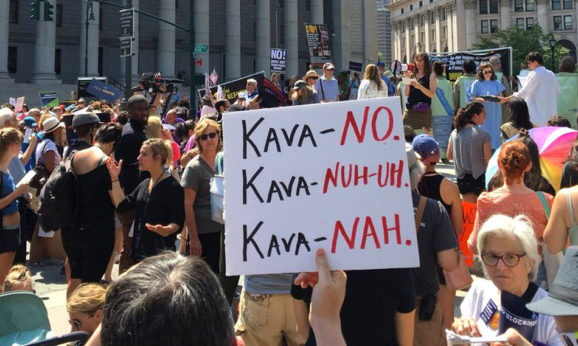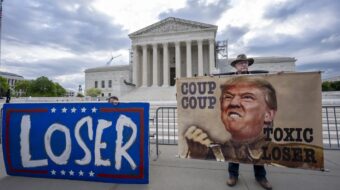
WASHINGTON—The clouds hanging over the Brett Kavanaugh nomination and the even darker clouds enveloping President Trump who nominated him to the Supreme Court burst into fireworks here in the U.S. Senate today. Democrats appalled over the Republican rush job to confirm Trump’s pick rose up one by one to attempt to postpone the hearings of the Senate Judiciary Committee as protesters in the gallery shouted and held up signs.
The protests by Democratic senators and by activists in the Senate chambers broke out against the backdrop of the latest nationwide CNN poll in early August. The survey showed 37 percent of respondents backed Kavanaugh as opposed to 40 percent who did not. The score among women was 28 percent in favor, 46 percent opposed. Together those figures show the largest ever public opposition to a Supreme Court nominee.
At the hearings, yesterday Republican Chairman Sen. Charles Grassley of Iowa, the chair of the Senate Judiciary Committee, was finally able to begin hearings two hours after the opening gavel. From their statements, it was clear that the ruling Republicans on the committee, regardless of the concerns of the Democrats or the public, have already made up their minds.
Whether Kavanaugh, now a 12-year veteran judge of the U.S. Circuit Court of Appeals for D.C. – widely regarded as the nation’s second-most-important court – will go on the High Court will be up to the 51 Republicans, 47 Democrats and two Democratic-leaning independents in the upper chamber of Congress.
And they won’t get a chance to vote until the Senate Judiciary Committee finishes its scheduled hearings on Donald Trump’s nomination of Kavanaugh to the tribunal – a nomination which has drawn opposition from legal groups, the AFL-CIO, People for the American Way and many other organizations and individuals.
The committee hearings opened Sept. 4 and are scheduled to run through Sept. 7, but may extend into the weekend, chairman Charles Grassley, R-Iowa, said. Between protesters inside and outside the hearing room and Democratic senators protesting lack of time to review 140,000 pages of Kavanaugh documents dumped on them the night before, they probably will.
“We have been denied access to the documents we need, which turns this hearing into a charade and a mockery of our norms,” said Sen. Richard Blumenthal, D-Conn., a former state attorney general. “Mr. Chairman, I therefore move to adjourn this hearing.”
Grassley turned that down as a woman protester yelled out from the gallery: “This is a mockery and a tragedy of justice!” Other protests could be heard from the back of the room during senators’ opening statements. At least one other protester, the president of the women’s rights group UltraViolet, was arrested for disturbing the proceedings. Capitol police escorted others out.
Kavanaugh’s rulings on workers’ rights, reproductive rights, presidential power and accountability and a host of other issues have sent the AFL-CIO and its allies to the barricades and into the streets – from Anchorage, Alaska to Bangor, Maine — to drive home the point that Kavanaugh would be a hard-right justice willing and ready to overturn current law on all those issues and more.

“Judge Kavanaugh routinely rules against working families, regularly rejects employees’ right to receive employer-provided health care, too often sides with employers in denying employees relief from discrimination in the workplace and promotes overturning well-established U.S. Supreme Court precedent,” AFL-CIO President Richard Trumka said in announcing labor’s opposition to Kavanaugh.
“The current Supreme Court has shown that it will side with greedy corporations over working people whenever given the chance, and this nominee will only skew that further,” he continued.
“Working people expect the Supreme Court to be the fairest and most independent branch of government. Any senator who believes Supreme Court justices should protect the rights of all Americans should reject this nomination and demand a nominee who will protect the rights of working people and uphold our constitutional values of liberty, equality and justice for all…We won’t stand for any politician who supports justices who put our rights at risk,” Trumka, who has a law degree, said.
As the hearings began, the nation’s largest labor federation stepped up its anti-Kavanaugh campaign, with “targeted digital ads” on the websites of leading media in states represented by key senators on the coming vote. “These banner and display ads urge local residents to contact their senators to ask them to vote against Judge Kavanaugh’s confirmation. Readers of the Anchorage (Alaska) Daily News, Bangor (Maine) Daily News, Indianapolis (Ind.) Star, the Charleston (W. Va.) Gazette and the Grand Forks (N.D.) Herald will be able to see these ads on these newspapers’ landing pages.”
“In addition to these ads, the federation is running a video on Facebook and Twitter, highlighting Judge Kavanaugh’s poor record supporting working people,” fed spokesman Gonzalo Salvador said.
“In ruling on a case involving the rights of telephone company employees to wear union t-shirts while they were working, Brett Kavanaugh began his opinion with the observation that ‘common sense sometimes matters in resolving legal disputes.’ But, as the case illustrates, sometimes ‘common sense’ can be a mask for class prejudice,” added Andrew Strom, associate general counsel of SEIU Local 32BJ – the janitors section of the Service Employees – in the On Labor legal blog.
The National Labor Relations Board ruled for the workers, whose T-shirts, with black and white stripes read “pri$oner of AT&T,” citing vicious company stands during bargaining. Kavanaugh threw out the pro-worker decision. That’s when the judge used the “common sense” phrase, Strom noted.
But when it comes to Kavanaugh, worker rights take a back seat to reproductive rights, with organizations – including some that have never before taken a stand on Supreme Court nominees – opposing Trump’s pick.
“For the first time since our founding in 1992, the Center for Reproductive Right is opposing a Supreme Court nominee,” the legal group said in a full-page announcement in the Washington Post. “We do not take this decision lightly,” center CEO Nancy Northup stated.
Pointing out that it has argued reproductive rights cases before both Democratic-appointed and Republican-appointed federal judges, including at the Supreme Court, the non-partisan center explained “we are rigorous about factual accuracy and careful legal analysis.
“After a thorough review of Judge Kavanaugh’s judicial opinions, speeches and writings, we have grave concerns about how he will rule…His judicial philosophy is fundamentally hostile to the protection of reproductive rights under the U.S. Constitution.
“The American people want a Supreme Court nominee who will represent the basic liberties guaranteed to all of us. Based on his record, Judge Brett Kavanaugh is not that nominee,” the center concluded.
“In a speech last September, Kavanaugh specifically praised William Rehnquist’s vote against Roe v. Wade” – the 1972 ruling legalizing abortion in many circumstances – “revealing his personal roadmap for criminalizing abortion. Kavanaugh also ruled the government should be able to block an undocumented young woman from obtaining an abortion,” said Ilyse Hogue, president NARAL Pro-Choice America. “Anti-choice groups said they are going ‘all-in’ for Kavanaugh, and we must do the same.”
That young woman was pregnant and undocumented, confined in a Texas holding cell during Trump’s roundup at the U.S.-Mexico border. Trump’s Justice Department tried to delay the abortion until after the 20-week limit under Texas law. Circuit Court judges ruled for her to have the abortion when she needed it; Kavanaugh dissented.

The center wasn’t the only group warning Kavanaugh would overturn the right to reproductive choice, should he join the other four GOP-named justices on the High Court. Indeed, tens of thousands of people hit the streets nationwide on August 26 in protests against the Kavanaugh nod. Others took their protests to the airwaves, social media and newspapers. Reproductive rights was their top concern.
But they also fear Kavanaugh’s rulings and votes on worker rights, gay-lesbian-bisexual-transgender rights, undocumented peoples’ rights and Kavanaugh’s limits – or lack of them – on presidential power and accountability.
“The very people who elected me their mayor and entrust me with the governance of our city are the same patients I care for daily in my work at the local hospital,” as a registered nurse, Belfast, Maine Mayor Samantha Paradis wrote in the Bangor Daily News, just after an August 26 anti-Kavanaugh protest In Bangor drew 100 people. That demonstration was one of hundreds nationwide.
“During my overnight shifts, I have heard from people who feel powerless in stopping Kavanaugh’s confirmation to the U.S. Supreme Court,” Paradis explained. “But they are not powerless, and neither is Sen. Susan Collins,” the Maine Republican, who is considered one of two possible GOP defectors on the Kavanaugh nomination, the mayor/RN said.
Both Collins and Sen. Lisa Murkowski, R-Alaska, are pro-reproductive choice. And Murkowski, at least, is keeping her powder dry.
“Kavanaugh’s nomination comes at a pivotal moment when the balance of the court, and therefore many of the issues we care most about — women’s rights, worker’s right, climate change — are at risk, Paradis continued.
“Despite telling Collins earlier this month that Roe is ‘settled law,’ Kavanaugh has shown us where he stands on abortion, and we should be worried about how he will turn the balance of the court against access to abortion.”
While Murkowski is keeping mum on Kavanaugh, even after an August 23 private meeting with the judge, her constituents aren’t. A poll of 602 Alaskan registered voters, commissioned by the ACLU there, showed an even split on Kavanaugh’s nomination – 44 percent for 42 percent against – before Alaskans heard about his record. Once they learned the details of his rulings, they turned against him: 39 percent for, 54 percent opposed. And 65 percent said he should not overturn abortion rights.
Then there’s the issue of presidential power and accountability. That, along with reproductive rights and the future of the Affordable Care Act, concerns People for the American Way.
“Kavanaugh thinks that Trump should be ABOVE THE LAW, unable to be indicted or even investigated,” the group said. “He suggested the unanimous Supreme Court decision in U.S. v. Nixon — which established that not even the president is above the law) was incorrectly decided.”
“And every day we’re finding out more about Kavanaugh’s radical far-right positions on everything from Big Money in politics and attacking the separation of church and state to his hostility towards disability rights and health care reform.”
“Kavanaugh is not just your run-of-the-mill narrow-minded elitist judge. He is a dangerous extremist who would do severe harm, dragging the court far, far to the right and turning back the clock on Americans’ fundamental rights,” it said. Retired Justice Anthony Kennedy, whom Kavanaugh would replace, was the court’s “last swing vote” on all those issues and more.
“It’s impossible to overstate how much is at stake with this nomination. If Kavanaugh is confirmed that it won’t be long until a woman’s right to choose and the Affordable Care Act are GONE.
“Kavanaugh essentially wants to undo the New Deal and embraces a legal philosophy that would lead to the dismantling of most of the legal rights and protections that Americans depend on,” it warned. That includes workers’ rights Medicare, Medicaid, civil rights and protecting the environment. “The list goes on and on.”
That doesn’t seem to matter to almost all Senate Republicans. Take, for example, Sen. Ben Sasse, R-Neb., a Judiciary Committee member who has criticized Trump for not following the rule of law. His comments on Trump’s nominee, though, are quite different:
“Brett Kavanaugh is a serious jurist known for careful deliberation. This doesn’t matter to many on the left. Sadly, the #Resistance is going to try to Bork him by portraying him as a cross between Lex Luthor and Darth Vader. This isn’t the apocalypse – this is an opportunity to thoroughly review Kavanaugh’s record, debate this seriously, and celebrate our system of checks, balances, and limited government.”
“To Bork him” refers to GOP President Ronald Reagan’s nomination of D.C. Circuit appellate judge Robert Bork to the High Court more than 30 years ago. Bork, by the way, was the last Supreme Court nominee with as little popular support as Kavanaugh: 38 percent for, 35 percent against, the rest undecided, in 1987.
After Democrats dissected Bork’s right-wing writings and opinions – which he defended – plus his role in Watergate, they then defeated him on the Senate floor. As a result, subsequent Supreme Court nominees from both parties have been carefully coached to say as little as possible about their views. Kavanaugh, who was scheduled to speak at the end of the Sept. 4 Judiciary Committee session, is expected to follow that precedent.

MOST POPULAR TODAY

‘Warning! This product supports genocide’: Michigan group aims to educate consumers

Hold the communism, please: SFMOMA’s Diego Rivera exhibit downplays artist’s radical politics

Ohio: Franklin County treasurer attends Netanyahu meeting, steps up Israel Bond purchases

After months of denial, U.S. admits to running Ukraine biolabs

“Trail of Tears Walk” commemorates Native Americans’ forced removal






Comments